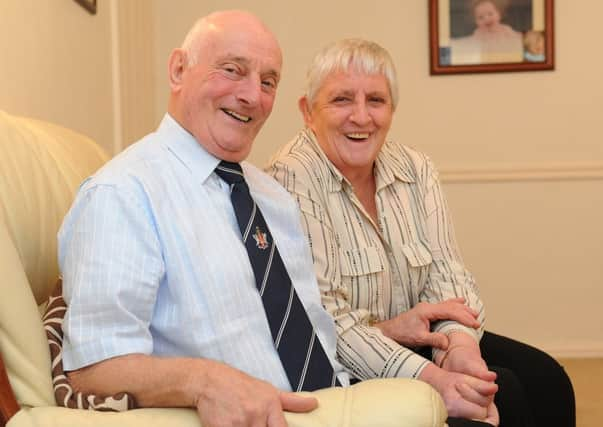Dementia campaigner to speak to world leaders at G8 summit


Trevor Jarvis, 72, who was diagnosed with vascular dementia after a stroke in 2001, has been invited to the assembly in London where a video he has made about living with the condition is to be shown to health ministers, researchers, pharmaceutical companies and charities from the world’s wealthiest developed nations.
The meeting at Lancaster House coincides with the announcement of plans by the health regulator today for a new inspection regime to improve the standard of care for dementia patients.
Advertisement
Hide AdAdvertisement
Hide AdIt also comes as the Alzheimer’s Society – which the Yorkshire Post is supporting through this year’s Christmas appeal – pledges to spend at least £100m on dementia research over the next decade.
Mr Jarvis, of Skellow, Doncaster, is attending the summit with wife and carer Ann as an ambassador for the charity, through which he has travelled the country giving talks and training to health professionals and students including at Bradford University, which awarded him an honorary doctorate in July.
“I am pleased that I’ve been invited,” he said.
“I would really love to talk to these people one-on-one because the videos have been a fantastic hit but that one-to-one really gets things across.”
Mr Jarvis, who has already met David Cameron after successfully campaigning for dementia patients’ rights to access their money with a signature instead of a pin number, added: “It doesn’t matter who they are at the end of the day, if they are the gentleman or lady next door or if it’s the Prime Minister or world leader in America.
Advertisement
Hide AdAdvertisement
Hide Ad“If it’s somebody that can help people with dementia, whether for a cure or to make their life a little better or safer, that’s what it’s all about.”
Today’s summit comes as the Care Quality Commission (CQC) unveiled plans to carry out unannounced inspections of the care of dementia patients in 150 care homes and hospitals in England.
Inspectors will examine how services help people with dementia to maintain their physical and mental well-being, how care services work together when people move between homes and hospitals, and how hospital admissions from care homes can be cut and lengthy stays avoided.
Local reports will be published on each service, with detailed judgments and information on any required improvements.
Advertisement
Hide AdAdvertisement
Hide AdA national report on the issue will also be published in May.
David Behan, chief executive of the CQC, said 670,000 people in England are estimated to have dementia and the number is expected to double over the next three decades.
“This is the first time CQC has undertaken a review which specifically looks at the care services that people with dementia use and rely on,” he said.
“It will address the key issues these people face, such as why admissions to hospital from care homes are higher for people who have dementia compared to those who do not have the condition.
Advertisement
Hide AdAdvertisement
Hide Ad“Our findings will draw conclusions on a national scale about what works well and where improvements are required.”
The new regime is expected to be welcomed at today’s summit, which will feature speakers including Health Secretary Jeremy Hunt and Margaret Chan, director general of the World Health Organisation.
Mr Hunt has called dementia a health and care “timebomb” with the number of people living with the condition predicted to triple worldwide to 135 million by 2050.
The Alzheimer’s Society has been instrumental in encouraging Mr Cameron to put the condition on the agenda as part of the UK’s presidency of the G8.
Advertisement
Hide AdAdvertisement
Hide AdNow it is urging leaders to come up with a collaborative global action plan for dementia research together with new ways to attract the best scientists, clinicians and professionals to the field, as well as calling for greater investment in research worldwide.
Chief executive Jeremy Hughes said: “For the past 40 years the Alzheimer’s Society has led the fight against dementia.
“We are pushing the boundaries to bring life-changing research to prevent, care and ultimately cure dementia closer to people with the condition, but we can’t do this alone. We urge governments and organisations worldwide to collaborate, think long-term and make meaningful promises to combat dementia now.”